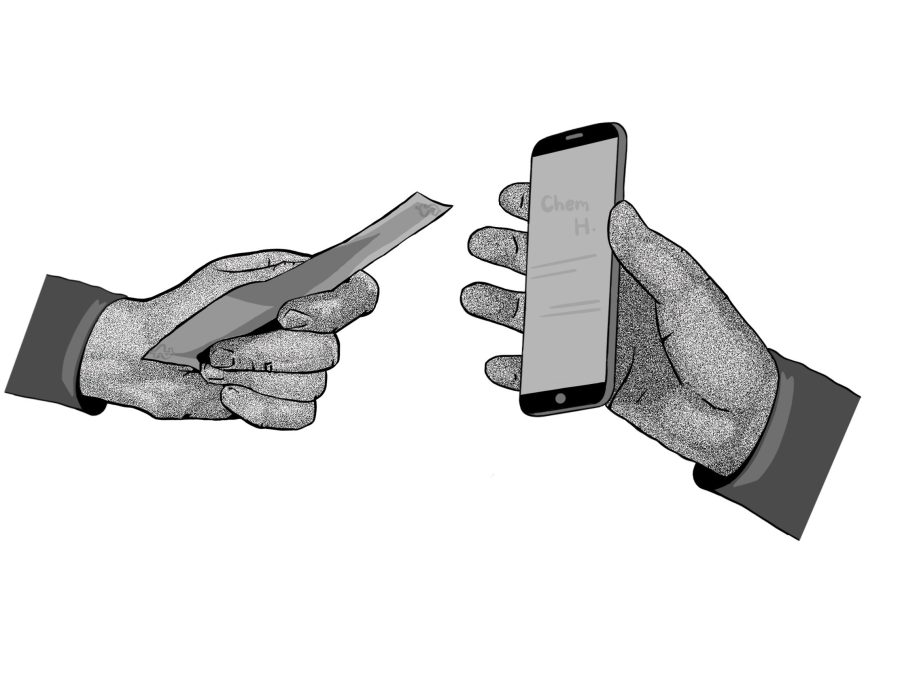Recent cheating incident reveals larger scheme
May 17, 2022
Up to 30 Chemistry Honors students were penalized for cheating when members of the class leaked photos of the free-response section of an upcoming unit test through a group text message.
The sophomore who reported the incident, and who agreed to be interviewed only if their name wasn’t used, said a group of students were taking a test before the rest of the class in an adjoining room due to a field trip that conflicted with the test date.
While the teacher was proctoring this early test, a student from the other room took a picture of a completed test sitting on the teacher’s desk.
This sophomore said they notified the teacher about the incident because it felt like the right thing to do.
“It should be an equal playing (field) for all students,” the sophomore who reported the incident said. “No one should have an advantage over others when taking a test.”
Another sophomore in the class, who also agreed to be interviewed only if their name wasn’t used, said students also cheated during the test by texting pictures of the test to their friends.
This sophomore said systematic cheating existed long before the most recent test.
“Cheating has been going on for at least this semester, if not last semester too,” the sophomore said. “This was a repeat occurrence where people would take pictures of the tests, and they never got punished for it.”
This sophomore also said pictures of tests usually ended up being shared in multiple, big group chats, which included students from nearly every Chemistry Honors class.
Another sophomore in the class who also agreed to an interview only if their name wasn’t used said photos of Chemistry Honors tests were occasionally sold too.
“A kid who took a picture of his test started using it as a business to sell (the tests) to other students for $5,” this sophomore said. “I personally know of someone who bought the tests. They got it for free through the group chats sometimes and had to buy (a test) other times depending on who took the picture of the test.”
Both Chemistry Honors teachers and Assistant Principal Michelle Steingart, who oversees the sophomore class and the science department, said they did not want to be interviewed for this story.
According to the Paly Student Handbook, academic dishonesty infractions are categorized into three tiers of offenses: Categories A, B and C. Category A violations include copying minor assignments, Category B violations include plagiarism or violations on major assignments and Category C violations include altering returned tests or stealing exams.
“Category C includes taking pictures of a test, which is something that has happened more often now,” Assistant Principal Erik Olah said. “Taking a photo, in my book, would be a third offense every time.”
The traditional disciplinary consequences for Category C violations include suspension and possible expulsion. Colleges must also be notified about the student’s academic dishonesty in their letters of recommendation according to the Student Handbook.
Olah said the overall nature of Paly academics likely play a role in student academic dishonesty.
“There’s a lot of pressure to succeed, and students may feel like they’re falling behind and need to take a shortcut,” Olah said.
Sophomore Siena Dunn, a Chemistry Honors student in the class period where the cheating incident happened, said poor performances in the class may have prompted students to take extreme measures too.
“A lot of people were especially disappointed by the last test,” Dunn said. “The grades weren’t as great as most people hoped.”
Another sophomore from the class who also agreed to be interviewed only if their name wasn’t used said legitimately achieving the grades she wanted in Chemistry Honors took a physical and mental toll on her, which she said may be why some of her peers chose to cheat.
“I’ve pulled multiple late nights before chem tests. It’s a habit by now because they’re so difficult,” this sophomore said. “I think PAUSD students can all agree that the environment Paly creates is a rat race. The fact that they’re compromising their integrity to get good grades makes the rat race impossible for a genuine and honest student to win.”
Paly Wellness Outreach Worker Shely Benitah said the social and academic pressures to achieve certain grades may make students feel afraid of failure, but that doesn’t mean they should cheat.
“Fear is a powerful motivator,” Benitah said. “Some students may use academic dishonesty as a coping mechanism to avoid what they may perceive as failure.”
However, Benitah said students should not let the stress of aiming high overwhelm them.
“No grade will ever reflect your inherent value and worth as a person,” Benitah said. “You are so much more than your grades.”










Bob Sikkiry • May 23, 2022 at 3:48 pm
I *heard* that there’s another thing going on here – not a justification for cheating, certainly, but another angle to the story. Apparently the two teachers are doing different curriculum – one easier, one harder – and the harder teacher writes the tests for both classes, in the name of “fairness.” Which is fair in one sense – the students of the easier teacher don’t get free As – but unfair in another sense, since they’re unprepared. Which doesn’t excuse cheating, but might be a contributing factor.
Concerned parent • May 22, 2022 at 8:56 pm
Challenging coursework/poor grades are not excuses to cheat. This is typical Palo Alto in making excuses for spoiled children when it comes to light that they have poor moral character. Very similar reaction when CVS had to change their procedures because of high theft during Paly lunch periods. Hold the kids accountable for their incredibly poor choices.
Paly Ao • May 22, 2022 at 2:45 pm
Fantastic reporting – would love a follow-up. Ultimate consequences for those caught – suspension? Expulsion? Slap on the wrist? Would this include every person in the group chat? What if they insist they didn’t want/request/use the leaked info? And – if everyone seemingly knew this has been going on for so long, why did no one speak up? I wonder if there is evidence of prior cheating from these same kids – and in other classes as well…
Feel bad for the PALY admins who are going to have to deal with the crazy parents who are going to insist their little snowflake did nothing wrong…Keep up the good work!
Otto Smothenbotham • May 20, 2022 at 12:11 pm
Good reporting! I hope there’s a followup indicating what the ultimate resolution was. Knowing what happened to the students involved, both those distributing and those receiving the photos, is an important part of the story.
Sophia B • May 18, 2022 at 4:16 pm
The students’ reasons for cheating does not excuse or exculpate them. However, this highlights a serious problem with how students perceive themselves and their worth in relation to the scores they achieve, as well as our society’s priorities and values, and the educational system at large.
It’s disturbing that our system champions scores and metrics (which all, but the most niave of people, know is manipulated through cheating in most competitive environments) over learning. School should educate, but unfortunately, instead is a tool to categorize and rank people in order to determine what school they will have access to next. Many kids couldn’t care less about learning. They only care about their grades. This is not the path to intelligent, thoughtful, healthy adults.
Tanya • Sep 11, 2023 at 2:43 pm
I realize this is an older article but it’s an important topic. The truth of the matter is it’s the parents. Not every kid cheats. Actually many don’t. They make sacrifices. The issue is kids don’t make sacrifices today. Parents want them to have it all. The field entitled to it. Oh little Johnny grew up poor he deserves it. Oh little sally grew up rich and its unfair to discriminate. No one has it all. The education system champions scores and metrics the same way sports and vocational schools do. The problem isn’t the scores. The problem is parents being unable to handle their kids aren’t elite students. For some reason academia is the ONLY place people complain about having to make sacrifices and put in the work. Parents need to stop trying to make their state school kid into a Harvard kid. Thats on the parent. We need to stop making the students who earn it the enemy . I dont care how many tutors you can afford, IQ tests are spot on. You cant teach to them.